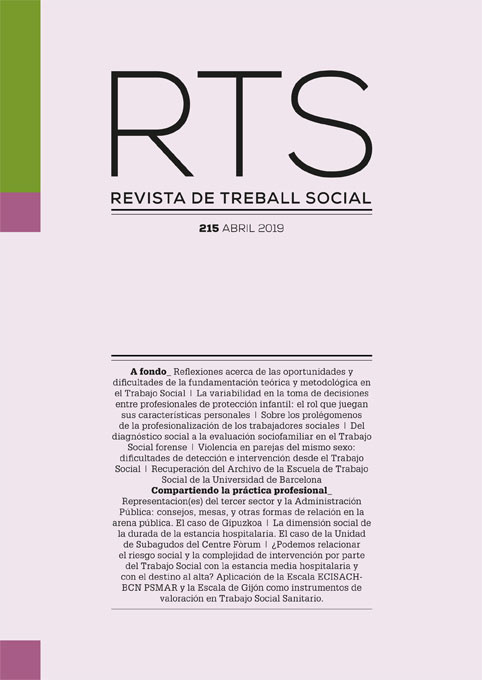This study raises the issue of the relationship between patients’ social circumstances and the time spent admitted to hospital, while also considering the influence that the complexity and the organisation of social hospital intervention may have on this period. The study benefits from a sample of 105 patients admitted, assessed and attended by social workers in the subacute care unit at Centre Fòrum in Barcelona in 2017 (n = 105). A quantitative methodology has been used by applying the Gijón socio-family evaluation scale, the ECISACH-BCN PSMAR complexity of social intervention in hospital scale and other compiled information about the profile of patients in the sample and their hospital stay. The results indicate that patients in circumstances involving risk or social problems spent more time admitted to hospital than those who benefitted from more favourable socio-family circumstances. Moreover, a trend involving an increasing length of stay was identified in those cases where the complexity of the social intervention was higher. Nevertheless, when organisation of social intervention has been early and proactive, patients have tended to undergo shorter hospital admissions regardless of their social risk levels, thus reducing the effect of the complex nature of the social interventions performed. In this regard, social healthcare work is vindicated as a profession that is not in conflict with the efficient use of healthcare resources; rather, it could be one that does facilitate this.
Article
The social dimension of the length of a hospital stay. The case of the Centre Fòrum subacute care unit
Ceballos, T. M., Velásquez, P. A., i Jaén, J. S. (2014). Duración de la estancia hospitalaria. Metodologías para su intervención. Revista gerencia y políticas de salud, 13(27), 274-295.
Colom, D. (2000). La plani cación del alta hospitalaria. Saragossa: Siglo XXI de España Editores.
Generalitat de Catalunya (2014). Criteris de plani cació sobre hospitalit- zació i alternatives assistencials en l’atenció a la cronicitat. Generali- tat de Catalunya: Departament de Salut.
Hendy, P., Patel, J. H., Kordbacheh, T., Laskar, N., i Harbord, M. (2012). In-depth analysis of delays to patient discharge: a metropolitan teac- hing hospital experience. Clinical Medicine, 12(4), 320-323. Recupe- rat de: http://www.clinmed.rcpjournal.org/content/12/4/320.long
Morro, L. (2017). Factores sociofamiliares y estancia hospitalaria: la complejidad de la intervención social en el área de la psiquiatría de agudos. Aplicación de la escala ECISACH-BCN PSMAR. Alternativas: Cuadernos de trabajo social, 2, 137-160.
Morro, L., González, S., Pineda, I., Cañete, M. J., Casals, A., Vallve, M., et al. (2017). Trabajo social sanitario y complejidad: traducción al español y validación a nuestro medio de la escala de complejidad de la intervención social con adultos en un contexto hospitalario (ECI- SACH), la escala ECISACH-BCN PSMAR. Agathos: Atención sociosa- nitaria y bienestar, 17(1), 48-54.
Muñoz, M. (2003). Detección precoz del riesgo social en el ingreso hospi- talario y la plani cación del alta: Re exiones desde el Trabajo Social. Agathos: Atención sociosanitaria y bienestar, 3(3), 40-51.
Muñoz, M. (2004). Re exiones en torno al trabajo social hospitalario. Revista de Treball Social, 176, 51-56.
Ochando, G., i De Irizar, M. (2009). La plani cación del alta hospitalaria desde el trabajo social sanitario: el ingreso hospitalario como punto de partida. Agathos: Atención sociosanitaria y bienestar, 2, 30-39.
Ortega, M., Cabot, C., Porras, F., Cantos, M., Pastor, L., i Fàbregas, A. (2014). Intervención proactiva desde una unidad de geriatría en la atención del paciente crónico complejo ingresado en un hospital de agudos. Gerokomos, 25(4), 152-158.
Parker, S. (2005). Do current discharge arrangements from inpatient hospital care for the elderly reduce readmission rates, the length of inpatient stay or mortality, or improve health status? Copenhaguen: WHO Health Evidence Network.
Peñas, E. M. (2010). ¿Cómo viven los ancianos hospitalizados el retraso en la gestión de su alta? Evidentia: Revista de enfermería basada en la evidencia, 31(7), 20
Plaza, B., García, A. M., i Muñoz, M. (2006). Programa de detección del riesgo social en el Hospital de Teruel. Trabajo Social y Salud, 53, 151-167.
Richmond, M. (1917). Social diagnosis. Nova York: Russell Sage Foundation.
Rodríguez, M. J., García, A., González, A., i García, M. A. (2013). Trabajo Social con pacientes pluripatológicos hospitalizados: intervención precoz en situaciones de riesgo social. Portularia: Revista de Trabajo Social, 13, 67-76.
Serafin, M. R., i Espiritu, M. I. (2013). Creación y validación de una esca- la de complejidad de intervención, desde el trabajo social sanitario, con adultos en un contexto hospitalario (ECISACH). Agathos: Aten- ción sociosanitaria y bienestar, 13(1), 42-55.





